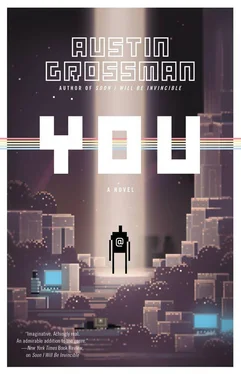The world had to be made entirely of periods. This was going to be a dungeon maze, so there had to be walls. Rooms. So walls would be made of asterisks, *s, and open space would be periods, .s. We made a rule that you couldn’t step on a *, and thus the grid of the world became a maze. And at the end of the maze, a prize, an exclamation point, !. When you stepped on it, the game ended—you had won!
We’d begun to answer that question—how to make a world. We still had no idea why one would, except that we needed to. We didn’t know it, but thousands of people were trying to solve exactly this problem. Simon had no particular experience with the issues, nor did he have a preconceived idea how to do it other than the way Dungeons & Dragons did it—graph paper, numerical ratings for how good you were at things, which determined your statistical likelihood of doing it, and lots and lots of rules and numbers determining what weapons there were in the world, what spells, what abilities, what monsters. A generation of lawyers and statisticians cut their teeth on the to-hit and damage tables of medieval fantasy. File it under yet another ridiculous thing that probably saved somebody’s life.
We worked on it all through fall semester, in between my abortive acting career, Lisa’s freeze-up on the debate team, and Darren’s first ignominious fistfight. Three days a week, I’d park my bike by the garage, climb two or three concrete steps, and ring the doorbell. One of Darren’s sisters would answer the door and almost in the same motion step aside while I wiped my sneakers and thudded down the carpeted stairs to the basement, where Simon would be. He’d wave me over to the C64 to look at a new game he’d found or a new feature he’d hacked into Tomb .
“I was thinking we could do flying creatures,” I said once. “Birds or bats. Just the boringest version, just turn off terrain effects for that subtype.”
Simon and Darren did their mind-meld glance to decide, then they both nodded.
“Sure, sure,” Darren said. “Let’s do it.”
“Great,” I said. In two hours I had created a subclass of monsters, FLYER, built out of hacked-together exceptions that let it ignore water, lava, acid pools, caltrops, and any floor-based traps and trip wires. Just birds and bats first, but later the category would encompass all dragonkind.
High school—no one wanted to say it—was terrifying. Every hour was like standing in a roaring blast furnace of excitement and terror and shame all at once. I’d come to Darren’s house bruised and raw from the day, grateful it was over and grateful I had a place to go that wasn’t home.
Simon or Darren would sit on folding chairs at Darren’s dad’s computer; I’d be in the leather recliner. Lisa claimed the plaid couch. If we had a milestone coming, we’d break at seven, when Darren’s mom brought us all dinner on paper plates, with a two-liter bottle of Sprite or Diet Coke; then at nine thirty, when it was time for the big check-in and test, we talked over how the week’s goals were going. One night I realized that Simon had started sleeping in Darren’s basement.
A lot of things about Simon are obvious only in hindsight. I was far too sheltered and self-involved to notice that we never went to his house. His whole life, he mixed with the children of doctors and professors, professional couples who fought about spousal hires and what city the wife would do her residency in. He gave off a little feeling that maybe there was something wrong at home, but it wasn’t the kind of thing you asked about.
Darren worked most weekends at the Baskin-Robbins, so Simon and I would ride our bikes four miles to Gordon’s Hobby Shoppe, riffling through racks of role-playing game manuals, modules, magazines, and rules supplements. Gordon’s was a hobby and crafts store that eked out an existence among the candle shops and lamp emporiums that populated the cul-de-sacs of suburban shopping malls, run by stoners with curious facial hair who did most of their business with model railroad builders and high-end doll collectors. They saw the market for gamers, and kept a magazine rack full of what we wanted.
We’d read all the manuals and pore over the maps, wander mentally from room to room. We’d wonder at the tantalizing histories behind the buildings, creatures, and odd artifacts, tracing the fragmentary links between Vecna and Saint Cuthbert and Mordenkainen, scraping the tiny bits of information out of each artifact’s list of powers, its built-in curses.
We learned about other computer games from eighth-page ads in the margins of Dragon magazine, the ones adorned with Gothic fonts and fantasy clip art and inviting readers to send their orders to post office boxes in Madison or State College or midwestern college towns. I remember padded manila envelopes arriving, hand-addressed, containing the data on actual cassette tapes, which we slotted into Darren’s cut-rate boom box, with its whining, wheezing gears, which we then plugged into Darren’s computer, which then served as a disk drive. Simon played them avidly, solved every puzzle, ground through every dungeon from first room to last. But he felt they lacked ambition.
Simon’s room had stacks of 5.25-inch disks in their white paper sleeves, all games, each one labeled in Magic Marker. Some of them had been copied over three or four times, the old game carefully crossed out and the new one added. Most of them had been double-sided manually.
He’d come to Darren’s after school—fuck even stopping by home—with the latest one. Darren’s mom might leave him a glass of milk, but mostly they left him alone; they considered him Darren’s project. He’d put on music, something loud on his headphones, seventies classic or prog rock, and for an hour, two hours, three, he could disappear as long as Darren’s dad would leave him alone, disappear the way he could in a fantasy novel, but differently.
Silly 2-D games, little guys jumping around on platforms— Sammy Lightfoot, Hard Hat Mack, cheap Mario Bros rip-offs. Adventures— Escape from Rungistan, Mystery Mansion. He didn’t even know who made the things—were they teenagers? Professional software engineers?—but somewhere out there people were inventing his medium without him.
The world narrowed to the tiny realm where he was always pushing on to the next screen, the next castle, always in a private dream of concentration and hard reflex, like a stoner kid doing bar chords over and over until his fingers were cramped and the muscle memory was there even in his sleep, always on the verge of some conclusion on the next screen, the crucial revelation that never quite appeared, that he could spend his life chasing, unless he learned to make them, unless he got to set the rules himself, unless he could put what he wanted in that castle, lock it away and bury it in a dungeon for a thousand years. He’d come home at nine or ten, biking home even in winter, snow in his eyes and silting up in his collar.
The dungeon couldn’t be just corridors. Simon had read his Tolkien a hundred times; this had to be Moria. There had to be great halls, chasms, locked rooms. That meant doors had to have multiple states—they could be open or closed, locked or unlocked. But if there were locks, that meant there had to be keys. And that meant there had to be objects you could pick up. So now there were things called objects, which could be displayed in the world, but could also be carried by your character—there was now inventory. And stairs. When you walked on stairs, you went to another map, notionally “up” or “down” from the map you were on. Just like that, the thirty-two-by-thirty-two world became an infinite series of levels extending upward and downward.
Читать дальше





![Ally Carter - [Gallagher Girls 01] I'd Tell You I Love You But Then I'd Have to Kill You](/books/262179/ally-carter-gallagher-girls-01-i-d-tell-you-i-lo-thumb.webp)






